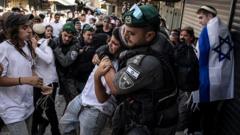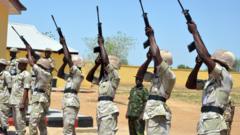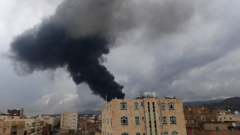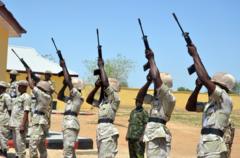Violence erupts during Jerusalem Day celebrations as far-right Israelis target Palestinians with insults and aggression. Opposition leaders condemn the actions as disgraceful, calling for unity and dialogue amidst ongoing conflict.**
Tensions Escalate as Far-Right Groups Clash with Palestinians During Jerusalem Day Celebrations**

Tensions Escalate as Far-Right Groups Clash with Palestinians During Jerusalem Day Celebrations**
An annual Jerusalem Day parade devolves into violence as far-right Israelis attack Palestinians, prompting condemnation from opposition leaders.**
Crowds of far-right Israelis rallied on Monday during the annual Jerusalem Day parade, resorting to violence and hostility towards Palestinians as they commemorated Israel's capture of East Jerusalem during the 1967 Arab-Israeli war. Protesters chanted incendiary phrases such as "death to Arabs," marking a troubling escalation in tensions within the city.
The event began with thousands of ultranationalist Israelis converging at Damascus Gate, a prominent entrance to Jerusalem's Old City. Activists displayed banners with provocative slogans, including "67 - Jerusalem in our hands; 2025 - Gaza in our hands," which incited anger among onlookers. As the march proceeded, reports surfaced of young Israeli men harassing Arab shopkeepers still attending to customers, while chants like "May your village burn" rang through the streets.
Israeli police swiftly intervened, arresting some of the most aggressive participants to curb further violence. National Security Minister Itamar Ben Gvir, a prominent figure from the Jewish Power party, made incendiary comments regarding punishment for "terrorists" during his speech, further inflaming an already tense atmosphere. His visit to the Al-Aqsa mosque compound, a site of deep religious significance, sparked additional outrage among Palestinian officials, who condemned the march and emphasized the need for regional stability.
Opposition leaders voiced their discontent with the scene unfolding in the Old City, highlighting the destructive nature of such displays. Yair Lapid criticized the actions as an affront to Judaism and emphasized the need for a Jerusalem inclusive to all faiths—Jews, Christians, and Muslims alike. Fellow opposition figure Yair Golan shared similar sentiments, condemning the stark display of hatred and calling for a fight against racism and bullying.
Each year, the Jerusalem Day parade culminates at the Western Wall, the holiest site for Jewish prayer in the city. This year's festivities coincided with heightened military operations in Gaza and a backdrop of escalating violence following Hamas's deadly attack on October 7, which claimed numerous Israeli lives and ignited wider conflict.
As tensions continue to mount, the conflicting claims over East Jerusalem—the desired capital for both Palestinians and Israelis—remain a significant point of contention in the ongoing struggle for peace in the region. The future of Jerusalem, marked by division and hostility, hangs in the balance as leaders express the pressing need for dialogue and reconciliation, both within the walls of the city and beyond.


















